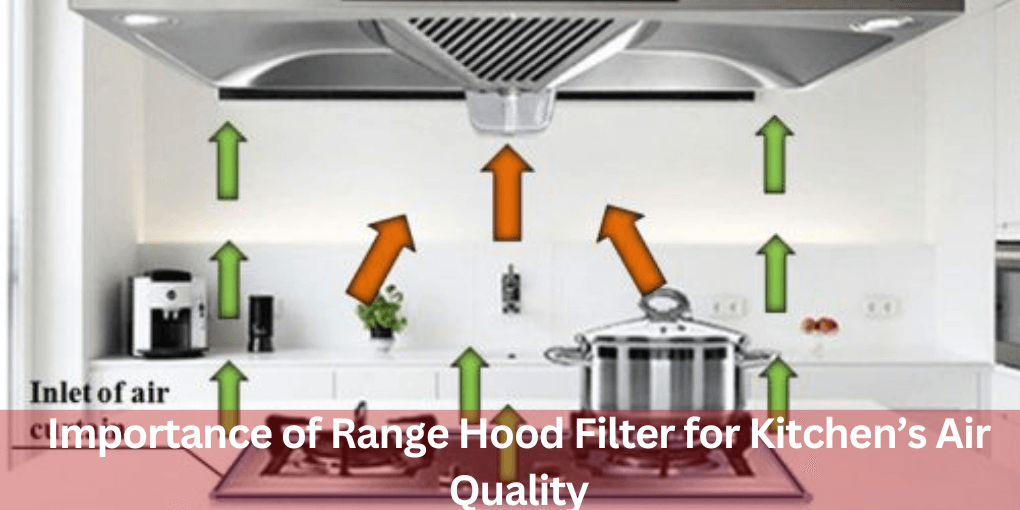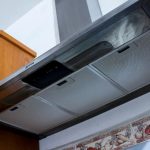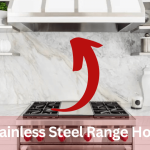Cooking is an essential activity in most households, but it can also lead to poor indoor air quality and fire hazards.

This is where range hood filters come in. Range hood filters are an integral component of range hoods, which are ventilation systems installed above the stove to remove smoke, steam, and other airborne particles produced during cooking.
Range hood filters play a critical role in trapping grease, smoke, and other pollutants.
It prevents them from circulating in the air and causing health hazards or fire hazards.
In this blog post, we will explore the importance of range hood filters in maintaining a healthy indoor environment, preventing fire hazards, and prolonging the lifespan of range hoods.
We will also discuss the different types of range hood filters and provide tips on how to maintain and clean them effectively.
What range hood filters?
Range hoods are ventilation systems put above the stove to remove smoke, steam, and other airborne particles created during cooking. Range hood filters are part of range hoods.
Range hood filters are designed to trap grease, smoke, and other pollutants that are produced during cooking.
Range hood filters come in a variety of designs, including mesh, baffle, and charcoal filters.
These filters work to trap and remove airborne particles and pollutants.
They require different methods of cleaning and maintenance to ensure their effectiveness over time.
Types of Range Hood Filters
Sure, here are some types of range hood filters:
Mesh Filters
These are made of layers of aluminum or stainless steel mesh that trap grease and other particles. They are the most common type of range hood filter and are easy to clean.
Baffle Filters
These filters use a series of metal panels with curves and ridges to trap grease and other particles. They are more effective than mesh filters and are also dishwasher-safe.
Charcoal Filters
These filters are made of activated carbon and are designed to absorb odors and smoke. They are commonly used in ductless range hoods.
Paper or Fiber Filters
These are disposable filters made of paper or fiberglass and are found in low-cost range hoods.
They are not as effective as other types of filters and need to be replaced more frequently.
Foam Filters
These filters are made of washable foam and are used in recirculating range hoods. They are effective at trapping grease and other particles but need to be cleaned regularly.
Hybrid Filters
These are a combination of baffle and charcoal filters, providing both grease and odor removal. They are typically more expensive but provide effective ventilation.
Benefits of Using Range Hood Filters
Using range hood filters provides numerous benefits for both homeowners and their households. Here are some of the most important benefits of using range hood filters:
Improved indoor air quality
Range hood filters effectively trap grease, smoke, and other pollutants produced during cooking.
They prevent circulating in the air and potentially cause respiratory problems.
Reduced fire hazards
Range hood filters also trap flammable particles, reducing the risk of fire hazards in the kitchen.
Increased lifespan of range hoods
By trapping pollutants and preventing them from clogging the range hood, filters help prolong the lifespan of range hoods and reduce the need for costly repairs or replacements.
Enhanced kitchen aesthetics
Clean range hood filters not only improve indoor air quality but also enhance the appearance of the kitchen.
Increased property value
Having a well-maintained range hood with effective filters can increase the value of a property. Potential purchasers may find it more alluring.
Importance of range hood filters
The importance of range hood filters lies in their ability to improve indoor air quality. It reduces fire hazards and maintains the lifespan of range hoods. Here are some of the key reasons why range hood filters are important:
Improved indoor air quality
Cooking produces smoke, steam, and other airborne particles that can be harmful to human health.
Reduced fire hazards
Cooking also produces flammable particles, such as grease, that can ignite and cause fires.
Range hood filters trap these particles, reducing the risk of fire hazards in the kitchen.
Prolonged lifespan of range hoods
Range hoods are expensive appliances that require proper maintenance to function effectively.
Range hood filters prevent pollutants from clogging the range hood. It lessens the need for expensive maintenance or replacement.
Enhanced kitchen aesthetics
Clean range hood filters improve the appearance of the kitchen by preventing the buildup of grease and grime on the range hood.
Increased property value
Having a well-maintained range hood with effective filters can increase the value of a property and make it more appealing to potential buyers.
Factors to Consider When Choosing a Range Hood Filter
When it comes to choosing a range hood filter, there are several factors to consider. Here are some important considerations:
Type of filter
There are three main types of range hood filters: metal, mesh, and charcoal.
Metal and mesh filters are washable and reusable, while charcoal filters must be replaced every six months to a year. Think about the filter type that best suits your requirements.
Filter efficiency
Look for filters with a high-efficiency rating. The efficiency rating determines how many airborne particles a filter can trap.
A higher efficiency rating means the filter can trap more particles and keep your kitchen air cleaner.
Size of filter
Ensure that the filter is the correct size for your range hood. A filter that is too small won’t be effective, while a filter that is too large won’t fit properly.
Brand compatibility
Ensure that the filter you choose is compatible with your range hood brand and model.
Using a filter that is not designed for your range hood can result in poor performance and potential damage to the appliance.
Maintenance and replacement
Consider the ease of maintenance and replacement of the filter. Look for filters that are easy to clean or replace and that have clear instructions for proper maintenance.
Maintenance and Cleaning
Proper maintenance and cleaning of range hood filters are essential for their effectiveness and longevity. Here are some tips for maintaining and cleaning range hood filters:
- Range hood filters come in different types, and each type requires different cleaning methods. Always refer to the manufacturer’s instructions for the specific type of filter you have.
- Range hood filters should be cleaned regularly to prevent the buildup of grease and grime. Depending on usage, it’s recommended to clean the filters once a month or every three months.
- Use a degreaser or dish soap and hot water to clean metal and mesh filters. Charcoal filters cannot be cleaned and must be replaced every six months to a year.
- Soak metal and mesh filters in hot water and dish soap for 10-15 minutes before scrubbing them with a brush or sponge.
- After cleaning, let the filters air-dry completely before reinstalling them.
- Charcoal filters cannot be cleaned and must be replaced every six months to a year. Metal and mesh filters should also be replaced when they become damaged or are no longer effective.
Decreased Maintenance and Replacement Costs
Regular maintenance and cleaning of range hood filters can also lead to decreased maintenance and potential replacement costs. Here’s how:
Improved performance
Clean filters allow range hoods to work more efficiently. They reduce the strain on the motor and other components.
This can help extend the lifespan of the appliance and reduce the need for repairs.
Energy savings
When a range hood has to work harder to do its job, it can use more energy, leading to higher energy bills.
By keeping filters clean, range hoods can work more efficiently, reducing energy usage and saving money on utility bills.
Reduced risk of fire
Grease buildup in range hood filters can increase the risk of fire in the kitchen.
Regular cleaning and maintenance of filters can help reduce this risk and prevent costly damages and injuries.
Shortened Lifespan of Range Hoods
Neglecting to clean or replace range hood filters can result in a shortened lifespan for the range hood itself. Here’s why:
Clogged filters
Range hood filters trap grease and other airborne particles. These contaminants may build up and clog the filters.
They reduce their effectiveness and cause the range hood to work harder to remove smoke and steam from the air.
Reduced airflow
A clogged filter can also restrict airflow, which can cause the range hood’s motor to overheat and potentially burn out.
Increased wear and tear
When a range hood has to work harder to do its job, it can cause increased wear and tear on the appliance’s components. This can lead to costly repairs or the need for a premature replacement.
Conclusion
Range hood filter plays a crucial role in maintaining a safe, healthy, and pleasant cooking environment.
They help to filter out airborne particles, prevent grease buildup, and reduce the risk of fire in the kitchen.
Choosing the right filter and maintaining it can lead to improved performance, energy savings, and a longer lifespan for the range hood.
By investing in range hood filters and regularly cleaning or replacing them, homeowners can enjoy a cleaner, safer, and more efficient kitchen.

Freda is a passionate foodie and kitchen gadget enthusiast. With over 10 years of experience in the culinary industry, Freda brings her expertise in testing and reviewing kitchen gadgets.




